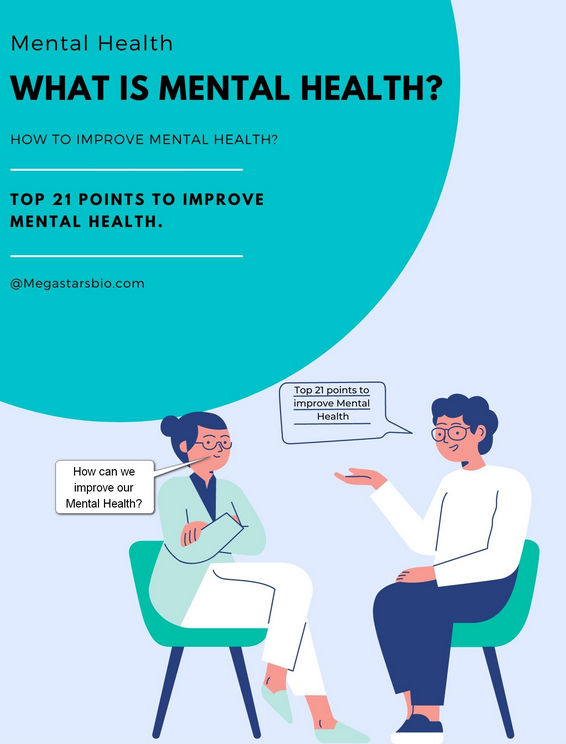How to improve mental health? According to the World Health Organization, mental health is a state of emotional well-being that enables people to live productive and fulfilling lives. It is not simply the absence of a psychiatric disorder.
Mental health means more than just being happy it can also include having a positive life view, using time constructively, and maintaining personal relationships both inside and outside of work. It also involves recognizing strengths and weaknesses in yourself with regards to decision making; whether that would be how well you deal with pressure or how much you cope when things go wrong.
Mental illness is the third leading cause of disability worldwide, affecting nearly 300 million people at any given time. In the United States alone, over 18 percent of individuals suffer from a significant mental illness, and it is regarded as one of the most prevalent causes of disability.
The good news is that people who suffer from mental health can improve their lives and chances for successful treatment with a little bit of effort and support! This article advises on how to improve your mental health to stay strong mentally and physically. Read more about How to Improve Mental Health?
What is Mental Health?
Table of Contents
Before going into a deep discussion about the improvement of mental health, people have to understand what is mental health? Mental health is the overall wellness of the mind, body, and spirit of a person.
It includes how a person thinks, feels, and behaves, the relationships they have with other people (or how they feel excluded or isolated), their self-esteem, and mood. Although multiple types of mental illnesses impact the quality of someone’s life, most mental illnesses can be linked back to stress caused by overthinking or worrying too much.
The term “mental health” refers not only to the presence or absence of a mental disorder, but also to the way a person behaves, feels, and thinks. A person’s thoughts and feelings influence how they act in the world. The difference between good mental health and bad mental health is determined by looking at an individual’s overall adjustment. If the person feels like they have control over their life, they can do things that make them feel good and can live up to their potential then they have mental health.
For example, someone with mild depression can work out, eat right, and manage their relationships as long as they feel better. They may also have the ability to make positive changes in their life.
Also Read: How to Start a Weight Loss Journey in 2022?
What is Mental Illness? How much does it cost the United States economy?
According to Mental Health America, each year in the United States, an average of $63 billion is spent on mental health care and overall illness related to mental illness. What are some major symptoms of mental illness? Chances for recovery of mental health conditions vary greatly depending on how severe they are when they first occur. This article outlines the primary symptoms that people suffering from mental illnesses feel.
Mental health disorders are common in the United States, with almost half of all American adults reporting a mentally sick day within the past 30 days. Mental health illnesses can be serious and sometimes debilitating, but they can also be treatable. This article provides information on how to recognize a mental disease, how many Americans are impacted by mental illness, and how to get rid of it.
Depression is one of the most common mental illnesses that Americans face. It’s an illness that affects the mind and profoundly affects the body, which makes it important to receive help and treatment as soon as possible. This article provides information on depression symptoms and how they can be treated.
New technology has made access to mental health care services available to more people, including those in rural areas or trouble getting around.
Many institutions in the United States specialize in mental health, including hospitals and clinics. This article provides information on two of the most common types of institutions—public and private facilities—and where they can be found.
Also Recommended: Does Fruit Help You Lose Weight?
How to improve Mental Health?
We’re all human, and we all need some time to take care of ourselves. Sometimes our mental health takes a hit and it’s important to know what we can do about that. Every year, one in six adults will have a mental illness that disrupts their daily life. This mental illness can be brought on by stress, traumatic events (like a car accident, assault, or major loss), or chemical imbalances in the brain. For some people, these illnesses develop slowly over time.

At times like these, we have to remember that people can’t be expected to feel healthy if their environment is making them sick. It’s important to take care of ourselves, and it’s also important to make sure that the places we spend our time are supportive. What we can do is change the way that we interact with our environment, the way we support ourselves, and find a healthy balance in our lives.
Also Recommended: How to Start a Weight Loss Journey in 2022?
Top 21 points to Improve Mental Health
Mental health is one of the most essential aspects of life. A mental health issue can impact everything in your life and it can be difficult to recover from such an obstacle, but there are several points that you can make to better your mental health. These top ten points will not only be beneficial for your personal life, but also for society at large, by encouraging open discussion about mental health.
- Be honest with yourself: The most important thing in dealing with a mental health issue of any kind is, to be honest, and open with yourself. What you eat, what you drink, what medications you take, how you deal with stress, and how much sleep you get — all of these factors can have an impact on your mental health. You should be honest about every aspect of your life, and if you require help, then you should seek it.
- Go see a therapist: A therapist is just as necessary as the medications you take and just as important, though slightly different from these. A therapist works with you to determine the underlying reason for your mental health condition and, if required, makes alternative recommendations. They may also train individuals on how to manage their mental health and deal with stress. Just as medicine can be harmful, counseling can enhance a person’s mental health, especially if it is addressed early.
- Get creative, and try something new: The best way to improve your mental health is to do something completely different, or something you love to do that is completely different from what you currently do. Try new hobbies — try painting or drawing or playing an instrument or photography. Try something completely different and see how it impacts you mentally. Maybe you’ll find that you enjoy it and want to continue with it. Perhaps it will be something entirely different from what you are accustomed to.
- Eat healthy food, eat right: Your mental health is more vital than anything else, but your body is just as important as your mind — and a person might become overworked or under-rested and have physical symptoms such as depression, and anxiety, or diabetes risk. Healthy food, exercise on a regular basis and get plenty of sleep. Eat right and your mental health will improve.
- Work out: Physical activity is great for your body and mind — so much stress can be relieved by a good workout session. Exercise releases endorphins — hormones that make you feel happy, reduce anxiety, and help you feel good overall. Physical activity can also improve your mood and make you sleep better at night. Not only is exercise good for your body, but it’s also good for your brain — becoming an exerciser can keep your mind engaged and improve the way you think.
- Get therapy: If you have a mental health issue that isn’t resolving on its own, then talk to a therapist about it. A therapist works with you to work through whatever issues you have — they’ll help you work through what’s wrong or what’s bothering you, and they’ll also help find alternative solutions and ways to think of things differently.
- Find a support group: A support group is very important in mental health because it provides an environment where you can feel safe enough to discuss or vent about your mental health issues, or even just to talk about them in general. These types of groups can be anything from a local club that meets once a week to a social network on Facebook, to simply having several friends that you talk with regularly.
- Have fun: Being happy is an important part of mental health — too much stress and not enough fun can impact you mentally and make you depressed. Take a break once in a while, and find things that you can enjoy. It doesn’t have to be something big; it can be as easy as watching television, playing with your children, or sitting on the balcony and reading a book. Simply schedule some time for yourself to do something you enjoy. Simply set out some time for yourself and do something you like.
- Exercise: Some people think that exercise won’t help with mental health issues, but that’s far from the truth. Research has shown that exercise can be as effective as antidepressants and more effective than some anti-anxiety medications. It’s critical to choose an exercise that you love and can perform on a daily basis, whether it’s walking, jogging, swimming, yoga, or weight training – just get moving!
- Meditate: Meditation is very important because it allows the mind to relax and focus on the present moment. This can have an enormous impact on your mental health because you are not worrying about the past or future. You are simply focusing on what you are doing right now — and that’s it. When you are anxious, furious, or disturbed, it enables you to think clearly and relax. Just by sitting down in a quiet place for a few minutes every day, you can reduce the number of negative thoughts that enter your mind.
- Listen to music that has a beat that is easy enough for you to tap your foot or toe to the rhythm.
- Take a walk in the park with no directions or specific destination in mind – just go where your feet take you!
- Close your eyes and envision yourself on vacation at the beach, atop an active volcano, or traveling through Europe.
- Touch a tree, touch a dog, or snuggle with your cat. Take some time to be in the present moment by focusing on what you can feel.
- Fast forward 5 years and visualize yourself at the top of your career, where you want to be.
- Spend a moment with your special someone (or stranger), and ask them if they are happy and enjoying their life – even if they say they aren’t – make them laugh!
- Go outside, even if it’s a grey, rainy day.
- Play a game with your kids, and maybe even have a family-friendly competition. Go on an adventure in your imagination and see where they take you!
- Go to the beach and do some clean-ups or start waves in the ocean – whatever feels right!
- Talk to someone about your concerns/problems as well as listen to your other half – this is a major step forward in finding solutions! And finally,
- Breath especially, listen to your breath; it sounds silly, but this will help you sleep better and notice improvements in your life!
We hope you have discovered some new things that need to be tried, we know we did. Thanks for taking the time to read this article. Happiness is not an objective that anyone can reach by an act of their will. It is a patient and discipline-demanding art form.
Also Recommended: What is Yoga? How Does Yoga Help To Lose Weight?






